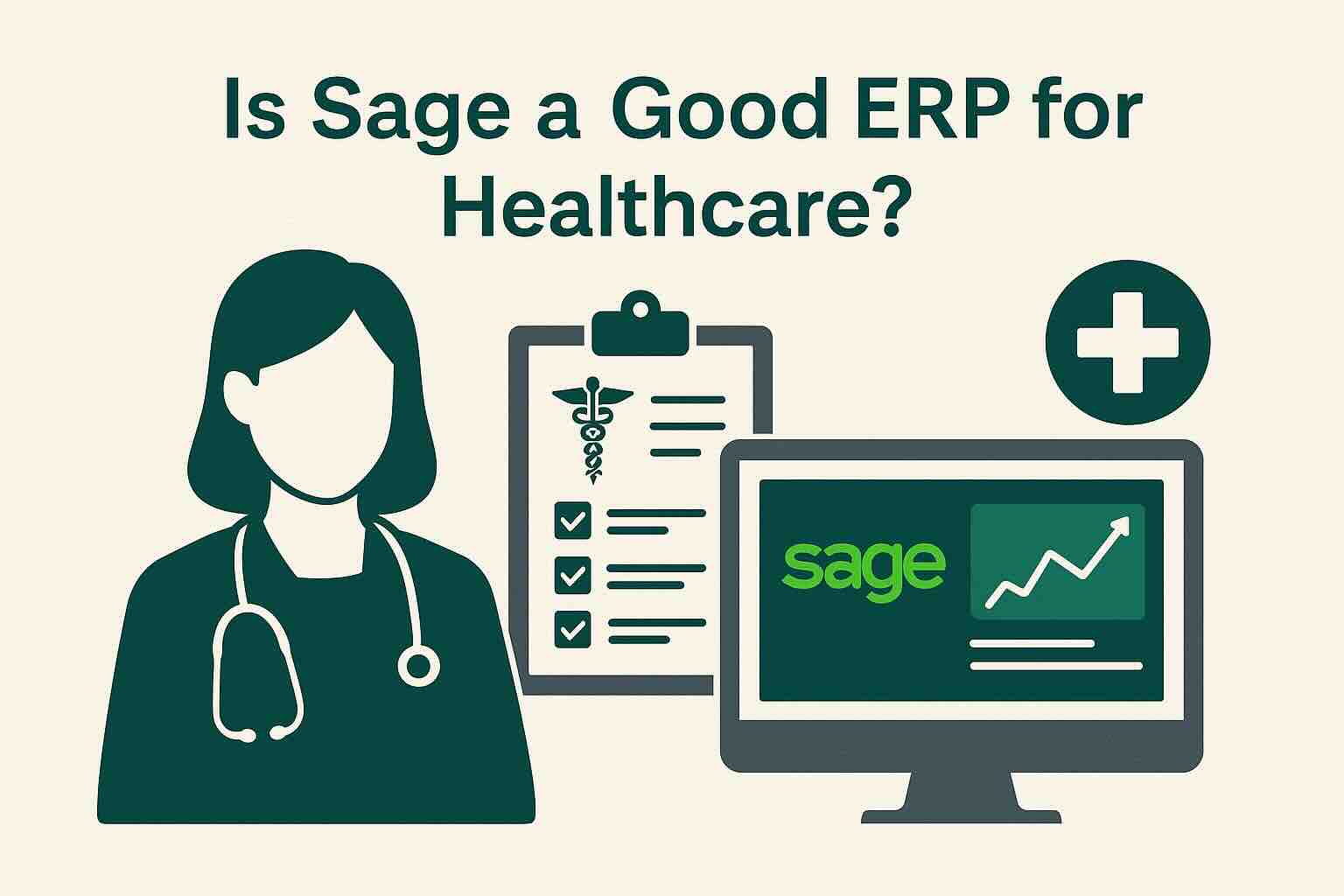Is Sage a Good ERP for Healthcare?

When healthcare organizations look for enterprise resource planning (ERP) software, the stakes are high. Hospitals, clinics, and medical practices need more than just financial tools – they need systems that can handle regulatory compliance, patient-related workflows, complex supply chains, and data security. Among the many ERP solutions available today, Sage has emerged as a strong contender. But is Sage a good ERP for healthcare? Let’s explore.
Understanding Healthcare ERP Needs
Unlike other industries, healthcare organizations have unique requirements when choosing an ERP. A robust healthcare ERP must:
-
Integrate financial, operational, and clinical data for better decision-making.
-
Support regulatory compliance with HIPAA and other healthcare-specific standards.
-
Handle complex supply chain and inventory management, especially for medical equipment and pharmaceuticals.
-
Streamline HR and payroll to manage a diverse workforce of doctors, nurses, and administrative staff.
-
Provide scalability for healthcare networks that grow through acquisitions or partnerships.
With these criteria in mind, let’s see how Sage for healthcare measures up.
What Is Sage ERP?
Sage offers a family of ERP solutions, including Sage Intacct and Sage X3, which are designed to support industries ranging from manufacturing to services to healthcare. These solutions provide:
-
Cloud-based financial management with real-time visibility.
-
Core accounting and budgeting features.
-
Automation of operational workflows such as procurement, billing, and payroll.
-
Advanced reporting and analytics that help leaders track costs, revenues, and compliance.
While Sage isn’t a healthcare-only ERP like Epic or Cerner, it provides versatile tools that can be tailored to healthcare organizations.
Key Benefits of Sage for Healthcare
1. Strong Financial Management
Healthcare providers deal with complicated billing systems, reimbursements, and insurance claims. Sage Intacct, in particular, excels at managing multiple entities, tracking revenue by department, and automating compliance-related reporting.
2. Compliance and Audit Readiness
Regulatory compliance is critical in healthcare. Sage ERP allows organizations to automate audit trails, maintain secure records, and meet requirements for HIPAA, GAAP, and other frameworks.
3. Scalability for Multi-Entity Operations
Large healthcare networks with multiple hospitals or clinics need consolidated financial reporting and inter-entity transactions. Sage’s multi-entity architecture makes it easier to manage growth and acquisitions without losing financial clarity.
4. Supply Chain and Inventory Efficiency
From pharmaceuticals to surgical equipment, supply chain efficiency is essential. Sage ERP provides inventory management tools that track usage, reduce waste, and improve cost control.
5. Cloud Flexibility and Accessibility
Healthcare teams often operate across different sites and need secure, remote access to systems. With Sage’s cloud-based solutions, authorized staff can access real-time data anytime, anywhere.
Potential Drawbacks of Sage in Healthcare
While Sage for healthcare has many strengths, it’s important to consider some limitations:
-
Not a clinical system: Sage does not manage electronic health records (EHRs) or direct patient care workflows. Organizations would need to integrate Sage with an EHR system like Epic or Cerner.
-
Customization may be required: Healthcare-specific features may require third-party add-ons or integrations, which can add complexity.
-
Learning curve for staff: As with any ERP, training is essential to ensure staff adoption and minimize disruption.
Who Should Consider Sage for Healthcare?
Sage ERP may be a good fit for:
-
Mid-sized healthcare providers seeking to improve financial management and compliance.
-
Multi-site clinics and networks that need consolidated reporting and scalable infrastructure.
-
Healthcare organizations with complex supply chains that want better control over inventory and procurement.
On the other hand, if your organization’s main priority is clinical data management, you may want to pair Sage with a specialized healthcare EHR.
Sage vs. Other ERP Options
Compared to healthcare-specific systems like Epic or Meditech, Sage focuses more on financial and operational efficiency rather than direct patient management. Against general-purpose ERPs like NetSuite or Microsoft Dynamics, Sage often stands out for its ease of use, scalability, and strong compliance features.
The choice ultimately depends on your priorities. If financial transparency, compliance, and scalability are at the top of your list, Sage is worth considering.
Final Verdict: Is Sage a Good ERP for Healthcare?
Yes, Sage is a strong ERP option for healthcare organizations, particularly those focused on financial management, compliance, and operational efficiency. While it doesn’t replace clinical systems, it can complement them by providing robust back-office support that keeps healthcare providers financially healthy and operationally efficient.
For healthcare organizations that want to balance regulatory requirements with financial performance, Sage delivers a reliable ERP solution that can grow with your needs. To find out more about Sage you can visit this link.
Ready to Find the Best ERP for Your Healthcare Organization?
Implementing the right ERP system could be the game-changer your business needs. With our AI-powered Compare ERP tool, you can effortlessly explore and compare solutions tailored to your unique business needs. Our advanced engine analyzes millions of data points across 100+ ERP solutions, delivering your top three picks based on your business priorities.
Best of all, it’s completely free. Take the first step toward streamlining operations and boosting productivity and start comparing today!









